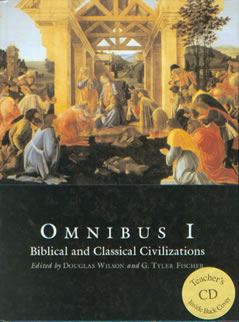 One of the most fun I’ve had was teaching on online course a few years back using the first Omnibus book. It was a live online “classroom,” and, no doubt, part of the reason I loved the work so much was because I had truly great students.
One of the most fun I’ve had was teaching on online course a few years back using the first Omnibus book. It was a live online “classroom,” and, no doubt, part of the reason I loved the work so much was because I had truly great students.
But it wasn’t just about teaching; I learned a bit more about the Bible and how to “use” it in the process. The genius of the book is that it makes students read the Bible stories side by side the ancient pagan stories of Near-Eastern and Western Civilization in roughly chronological synchronization.
Far from promoting some kind of synthesis, this format really gives students in Western society an opportunity for “deprogramming.” Homer and Plato get mixed in with Jesus in our cultural milieu. Going back to sources helps us free our minds.
I was thinking about it again recently in a missionary context. I fear (hopefully I’m completely wrong about this) is that many places rarely get much more than some stories about Jesus and a few other verses in the New Testament. For converting people from their gods and spirits to the True God, His Son, and the Holy Spirit, this is initially sufficient. But consider what is really involved in the Great Commission:
And Jesus came and said to them, “All authority in heaven and on earth has been given to me. Go therefore and make disciples of all nations, baptizing them in the name of the Father and of the Son and of the Holy Spirit, teaching them to observe all that I have commanded you. And behold, I am with you always, to the end of the age” (Matthew 28:18-20 ESV).
The Great Commission is an ongoing project.
And, though Jesus emphasizes training and commands, it requires stories. If nothing else, people already have stories. These stories make “sense” of their lives. Jesus, initially presented, comes to them as a powerful savior. He rescues them from the superstitions of other gods and perhaps spirits or magical forces.
But these stories are still the dominating background. And faith in Christ can take the form of demoting him to a god or magician in a scenario that is not true, but that maintains social and mental power even over Christians.
God gave us other stories. To even read them as embodied “principles” to be applied fails to realize their power. (In that understanding, the story is a husk from which proper moral behavior must be extracted; then the story is no longer important.) These stories are meant to be cultural bedrock. They provide a new historical foundation for every culture.
Don’t let the geography fool you. When the Gospel arrives in a nation, it is those people who are immigrating to a new Land. But failing to inculcate and saturate the new Churches with all of God’s word–stories, songs, and wise sayings–will leave them halfway there.